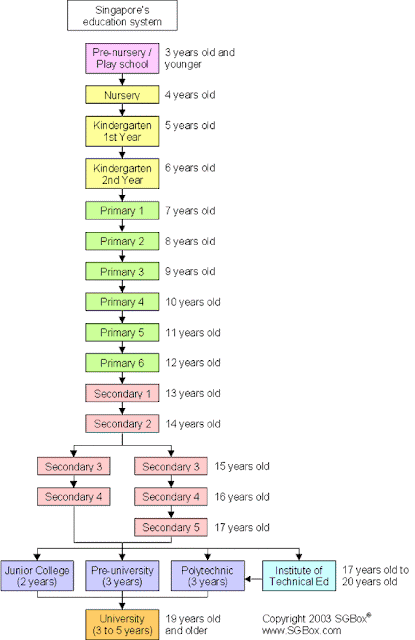From pre-nursery to university
A growing number of children in Singapore are attending pre-nursery or playschool education before the age of 4, though this is optional. Many children in Singapore also attend Nursery for 1 year at the age of 4, though this is also optional. By the age of 5, most children will be attending Kindergarten for 2 years (K1 and K2).
Formal education in Singapore begins at primary schools, starting from Primary 1 through Primary 6, which is similar to First Grade through Sixth Grade in the American system.
Children who pass the Primary Six Leaving Examination (PSLE) at the end of Primary 6 will progress to secondary schools, starting from Secondary 1 through Secondary 4 (Special/Express Stream), or Secondary 1 through Secondary 5 (Normal Stream). This is somewhat similar to Seventh Grade through Tenth Grade in the American system.
Students who pass the GCE 'O' Level examination at the end of Secondary 4 or 5 will then have to compete for admission to either a Junior College (2 years), a Polytechnic (3 or 4 years) or a Pre-University Centre (3 years). This is somewhat similar to Eleventh Grade and Twelfth Grade in the American system.
Finally, students who pass the GCE 'A' Level examination at the end of Junior College Year 2 or Pre-University Year 3, and students with excellent results at the end of Polytechnic Year 3/4 will then have to compete for admission to a local university, either National University of Singapore (NUS) or Nanyang Technological University (NTU).
Singapore's school textbooks and workbooks
All school textbooks, workbooks and assessment books have to follow the subject syllabus set by the Singapore education ministry for each level. Due to the progressive liberalisation of the school textbook market, you will find that all Singapore schools may be using only one textbook package for Mathematics and English for certain levels, while they are allowed to choose from a list of several textbook packages for Mathematics and English for the other levels.
Singapore's school assessment books
Other than school textbooks and workbooks, assessment books also make up a significant part of Singapore's success recipe in education. Assessment books provide children with additional practice and drills beyond those covered in school workbooks. Almost every child in Singapore owns at least a few assessment books for each subject. It is not uncommon for parents to buy dozens of assessment books for their children for each subject. Assessment books are also widely used in Singapore schools as part of their school curriculum, as well as tuition centres after school hours.
Singapore Math school assessment books provide children with more exercises, which are often more difficult and challenging, than those in the workbooks. Some assessment books provide only topical exercises, some provide only revision exercises, some provide only test papers, some provide only word problems, some provide only thinking skills exercises, and some provide a combination of two or more of the above.

Unlock your full potential with our expert IB Economics Singapore tutoring services. We specialize in providing personalized lessons that cater to the unique needs of every student. Our qualified tutors ensure you understand complex economic concepts and are well-prepared for your exams. With our comprehensive IB Tuition, you'll build a strong foundation, boost your confidence, and achieve your academic goals in IB Economics. Join us today to start excelling in your studies!
BalasHapus